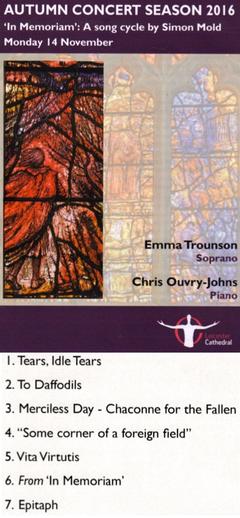Song Cycle: In Memoriam
Instrumentation Voice and Piano |
Other Information The song cycle In Memoriam was first performed in Otham Church near Maidstone, Kent, by Benjamin Odom [baritone] and Trevor Brearley [piano] on 14th September 2014. ´Merciless Day - Chaconne for the Fallen´, the third song in the cycle has been recorded on CD by treble Oliver Barton. The whole cycle was most recently performed by Emma Trounson [soprano] and Dr Chris Ouvry-Johns [piano] at Leicester Cathedral on 14th November 2016. Programme Note by Simon Mold, November 2016: I put this cycle together three years ago, using songs written both recently and way back when I was 15, as the hundredth anniversary of the Great War approached. The mood of the cycle moves from wistful looking back and thoughts on mutability, through meditations on the futility and despair of war, to an appreciation of individual honour and an acceptance of what Providence has in store for us all. Tears, idle tears [Alfred, Lord Tennyson (1809-1892)] accepts that we sometimes weep unexpectedly for “the days that are no more”: the music aims to complement the feeling of nostalgia, the piano part contributing to the emotions of an often lilting melodic line. To Daffodils [Robert Herrick (1591-1674)/Simon Mold] is a strophic poem, set in the manner of a lute song, that laments the shortness of our time on Earth; I’ve expanded the theme by adding a middle stanza [see below left] in the style of the original author. Merciless Day [Lizzie Ballagher] is a heartfelt plea for an end to the horrors of war, with a powerful text by a contemporary poet that finally cries out for a “new dawn”. The chaconne form of the music is intended, by its repeated patterns, to underline the apparent inexorability of conflict: 100 years ago it was Europe, today it’s Syria and Iraq. “Some corner of a foreign field” [Les Mortimer - see below right] is a nightmare vision of the First World War battlefields: the poet, another contemporary writer, takes his cue from a famous line of Rupert Brooke to create a landscape of despair, which the music shadows in the manner of a recitative. By contrast, Vita Virtutis (‘A virtuous life’) [Anon, adapted by SPM] focuses on how an individual, in spite of difficulties, can live honourably and decently, a sentiment echoed by the largely major mode of the music. The words are an adaptation of an anonymous poem carved into the stonework outside the Rutland Arms Hotel in Bakewell, Derbyshire. As well as giving the cycle its title, In Memoriam [Tennyson] is a short section of a much longer poem coming to terms with a friend’s life cut tragically short: the poet’s love for him, he says, echoes all around him forever in nature. The vocal line has a gentle rise and fall that underlines the quiet confidence of the words. Finally, Epitaph [Thomas Gray (1716-1771)] sets the famous last lines from the poet’s great Elegy for the common man: the music attempts to combine feelings of resignation, admiration, and awe at a soul’s hope of a final resting place in “The bosom of his Father, and his God”.
Benjamin Odom [baritone] and Trevor Brearley [piano] are pictured below right with Benjamin at the top and Trevor at the bottom.
|




